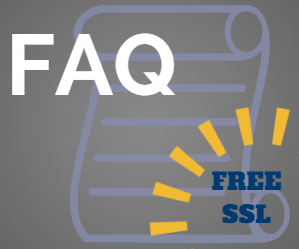
Answering Frequently Asked Questions About Free SSL services
We’ve discussed what SSL is in a previous post already, and we all know the benefits by now including improved page loading time, boosted search rankings, and enabled trust among visitors. Major hosting providers are now partnering with free SSL services like Let’s Encrypt to make the installation of SSL certificates as seamless as possible. However, many question the reliability and functionality of free SSL services. Can you really rely on a free SSL certificate for secure communication? Is it that easy? In a perfect world, any kind of service would work without fail or complications. We hope to address several of the concerns website owners may have about applying free SSL to their sites and also provide insight into how Cloudbric simplifies the use of SSL.
1) Are there technical disadvantages when using a free SSL service versus a paid one?
There are no technical disadvantages when using a free SSL certificate so long as it is a certificate authority trusted by your users. In other words, regardless of whether the service is free or paid, the nature of the SSL technology makes it such that the protocol works the same way. It secures sessions while the client and server are communicating to prevent data spoofing during any middleman attacks.
2) Is SSL compatible with all browsers?
It might be the case that your free SSL service provides certificates that are not widely accepted by all browsers or operating systems. For example, any version of Internet Explorer launched on Windows XP cannot validate Let’s Encrypt’s SSL, but all Chrome browsers can.
While it may seem like a setback, utilizing a free SSL certificate should not be problem for the grand majority.
3) Can I install free SSL on my subdomains?
The word “free” might make it seem like there are limitations when it comes to the number of sites on which you can install SSL. In reality, a free SSL service like Let’s Encrypt sets default rate limits that are “high enough to work for most people.” In other words, if you’re using dozens of domain names or names that change every day, the rate limits might pose an issue. But for the majority of people these tend to be fairly generous rate limits, especially since the services are free.
Paid services offer “wildcard certificates,” which allow you to apply SSL that that covers all your subdomains since wildcard certificates support subdomains and root domains. Usually for free services, you’ll have to create separate certificates for each subdomain. However, Cloudbric makes this step much easier by significantly simplifying the domain validation process, allowing you to simply input your domains and subdomains when you register and after you’ve successfully changed your DNS records to point to Cloudbric.
4) When installing SSL, is it necessary to manually update http URLs to https?
Misconfiguration when applying SSL can prevent users from reaching your website. Having to set up 301 redirects manually may also be complicated for the non-tech savvy user. Luckily, there are readily available plugins that configure configure websites to become HTTPS-enabled with the click of a button. Simply install any plugin that fixes all your websites’ HTTP contents to work with HTTPS. If you are a WordPress user, we recommend the plugin SSL Insecure Content Fixer. Additionally, when you’re using Cloudbric and are using SSL for the first time, you should install Cloudbric’s plugin to prevent a redirection error.
5) Do I have to manually renew the free SSL certificate every 90 days?
If you forget to renew your SSL certificate, you’ll get a display error on your website stating that your certificate is not valid, steering visitors away from your site. Paid services offer SSLs with longer renewal periods (up to a four years maximum), but they also must be renewed after that time period has passed. Free SSL services on the other hand must typically be renewed every three months. When you’ve signed up with Cloudbric, users don’t need to worry about free SSL certificates expiring or staying up to date with the latest SSL vulnerabilities since we renew them automatically for users.
SSL makes your website look more professional and gives your visitors peace of mind when using your site. While obtaining and installing an SSL certificate may seem like a daunting task, Cloudbric simplifies that process and makes SSL readily available for anyone who wants it. Whether that’s adding SSL on your subdomains or renewing the actual certificate, Cloudbric has you covered. For more help, please visit our help desk!





